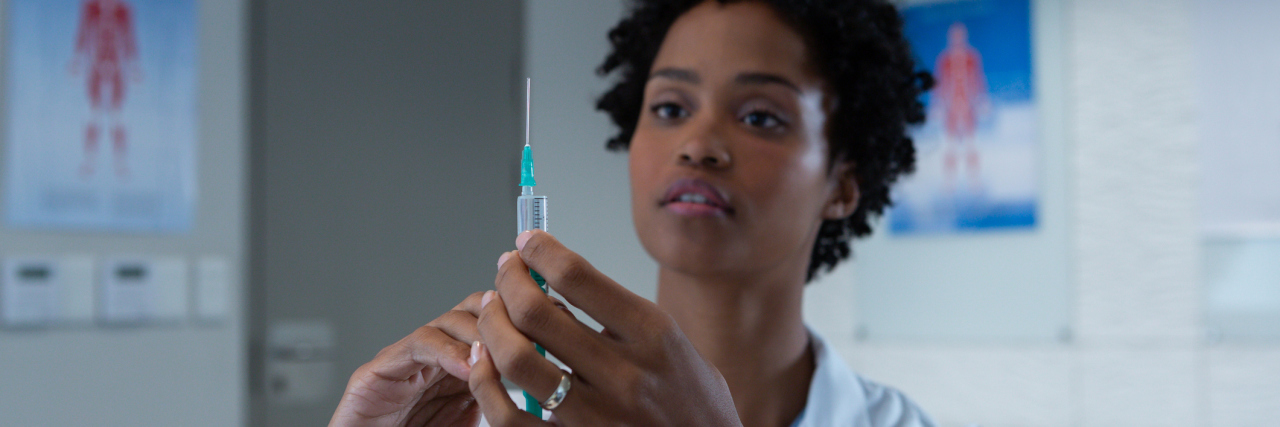As COVID-19 Vaccine Rollout Expands, Black Americans Still Left Behind
By Hannah Recht and Lauren Weber
Black Americans are still receiving covid vaccinations at dramatically lower rates than white Americans even as the chaotic rollout reaches more people, according to a new KHN analysis.
Almost seven weeks into the vaccine rollout, states have expanded eligibility beyond front-line health care workers to more of the public — in some states to more older adults, in others to essential workers such as teachers. But new data shows that vaccination rates for Black Americans have not caught up to those of white Americans.
Seven more states published the demographics of residents who have been vaccinated after KHN released an analysis of 16 states two weeks ago, bringing the total to 23 states with available data.
In all 23 states, data shows, white residents are being vaccinated at higher rates than Black residents, often at double the rate — or even higher. The disparities haven’t significantly changed with an additional two weeks of vaccinations.
In Florida, for example, 5.5% of white residents had received at least one vaccine dose by Jan. 26, compared with 2% of Black residents. That’s about the same ratio as two weeks ago, when the rates were 3.1% and 1.1%, respectively.
African Americans are being left behind because of barriers stemming from structural racism, as well as a failure to address nuanced hesitancy and mistrust about the vaccines and the medical system overall. The ongoing vaccination gap has prompted officials from around the nation to call for action.
“With covid-19 continuing to take a disproportionate and deadly toll on communities of color, we need urgent solutions to address health inequities and crush this virus,” said Rep. Steven Horsford (D-Nev.), first vice chair of the Congressional Black Caucus. He said he is working to pass legislation to address inequity.
Across the U.S., non-Hispanic Black Americans are 1.4 times more likely to contract covid, and 2.8 times more likely to die of it, than white Americans, according to a Centers for Disease Control and Prevention analysis.
The ongoing disparity in vaccinations may be a self-fulfilling prophecy: A new KFF poll shows a correlation between people who know someone who has gotten the vaccine and their willingness to get it. (KHN is an editorially independent program of KFF.) Thus, it is harder to gain ground in communities that don’t have many people getting vaccinated.
One of President Joe Biden’s first executive orders prioritized covid data collection. He also established the COVID-19 Health Equity Task Force, led by Dr. Marcella Nunez-Smith, who cited KHN’s analysis in a CNN town hall Wednesday when describing the country’s vaccine inequity. She stressed the task force’s need to build confidence in the vaccine and fix access issues.
But Dr. Céline Gounder, a former covid adviser for Biden, cautioned there is no quick fix to the structural inequities reflected in the numbers — and Congress still needs to decide on Biden’s $1.9 trillion covid relief plan.
“If they fund it in full, you’ll have the money to do some of these things,” Gounder said. “What you really need to do is change the system so it doesn’t happen in the first place.”
Earlier this month, the CDC told KHN it planned to add race and ethnicity data to its dashboard, but could not say when.
Citing KHN’s initial analysis, Sen. Elizabeth Warren (D-Mass.) tweeted on Jan. 19 that the CDC “needs to add race and ethnicity data to its public dashboard immediately — we can’t address what we can’t see.”
On Wednesday, CDC spokesperson Kristen Nordlund said officials plan to release the data publicly early next week.
Vaccine providers have already been required by the CDC to collect race and Hispanic ethnicity information for each person they vaccinate. In states that refused KHN requests for the data, local reports suggest disparities can be stark.
Many of the states that have shared data by race put it on dashboards that are difficult to understand. Some report data by dose, meaning that people who have received both doses are represented twice.
All 23 states that are reporting data by race break out numbers for Black and white residents. But beyond that, data is often limited. Eight of them do not report specific numbers for Native Americans and Alaska Natives, who are dying from covid at 2.6 times the rate of white Americans, according to the CDC study.
Massachusetts, for example, combines all data for people whose race is unknown with Native Americans, Alaska Natives, Native Hawaiians, Pacific Islanders and others.
Race and ethnicity information in health care data is often incomplete, and covid data is no exception. Although most states that provide the data have relatively low rates of missing information, in a few states race or ethnicity demographics are missing for half the people who have been vaccinated.
The data on Hispanic ethnicity is particularly fraught. Those who give vaccines are supposed to ask patients about both race and Hispanic ethnicity in separate questions, because Hispanics can be of any race or combination of races. In nearly all states that break out such numbers separately, the percentage missing Hispanic ethnicity information is far higher than those missing race information. Hispanic Americans have died at far higher rates than non-Hispanic white Americans.
The CDC data release should help standardize what data is available — in addition to possibly providing clarity on the dynamics in the 27 remaining states — but it is not yet clear how the CDC will address the gaps in data collection.
Kaiser Health News (KHN) is a national health policy news service. It is an editorially independent program of the Henry J. Kaiser Family Foundation which is not affiliated with Kaiser Permanente.
Header image via Wavebreakmedia/Getty Images

